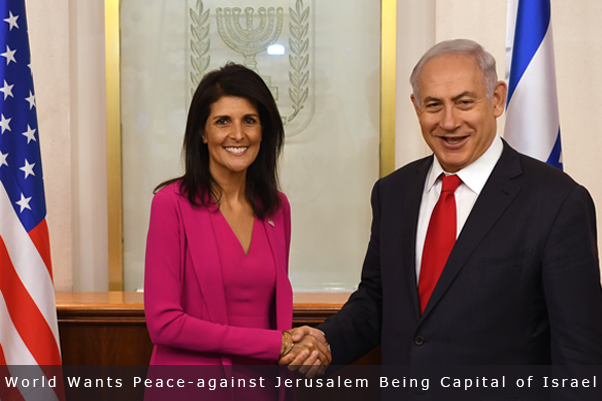PART ONE OF THIS ARTICLE traced the history of Palestine from the 1917 Balfour Declaration (which declared to the world Britain’s support for the establishment of a Jewish homeland in Palestine) up to the 1947-48 Israeli War that followed the withdrawal of British troops and cessation of British responsibility for the governance of Palestine, which was transferred to the United Nations (UN). It was then that Zionist forces occupied areas of Jerusalem and the West Bank that were designated by the UN as belonging to the Palestinians. Based upon this original designation of the West Bank to the Palestinians, the Palestinians, like the Israelis, had hopes of forming a future state in areas the international community with full US backing had ceded to them.
Anticipating the (47-48) evacuation of British forces and transfer of governance from the UK to the UN, the UN drafted a two state solution, one Israeli and the other Arab (Christian and Muslim).
According to the 1947 UN Resolution 184:
“Independent Arab and JewishStates and the Special International Regime for the City of Jerusalem, set forth in Part III of this plan, shall come into existence in Palestine two months after the evacuation of the (British) armed forces of the mandatory Power (UK) has been completed but in any case not later than 1 October 1948.”
“The period between the adoption by the General Assembly of its recommendation on the question of Palestine and the establishment of the independence of the Arab and Jewish States shall be a transitional period.”
The idea of two states was firmly established in directives given to the UN Commision charged with overseeing the transition from British control to the establishment of independent Israel and Arab states in Palestine:
“The Constituent Assembly of each State shall draft a democratic constitution for its State and choose a provisional government to succeed the Provisional Council of Government appointed by the (UN) Commission. The constitutions of the States shall…include inter alia provisions for:
(a) Establishing in each State a legislative body elected by universal suffrage and by secret ballot on the basis of proportional representation, and an executive body responsible to the legislature;
(b) Settling all international disputes in which the State may be involved by peaceful means in such a manner that international peace and security, and justice, are not endangered;
(c) Accepting the obligation of the State to refrain in its international relations from the threat or use of force against the territorial integrity of political independence of any State, or in any other manner inconsistent with the purposes of the United Nations;
(d) Guaranteeing to all persons equal and non-discriminatory rights in civil, political, economic and religious matters and the enjoyment of human rights and fundamental freedoms, including freedom of religion, language, speech and publication, education, assembly and association;
(e) Preserving freedom of transit and visit for all residents and citizens of the other State in Palestine and the City of Jerusalem, subject to considerations of national security, provided that each State shall control residence within its borders.
Fighting broke out almost immediately following the UN partition into Arab and an Israeli zones. Jewish nationalists backed by International Zionist Organizations, British support, and modern weaponry simply out gunned their poorly equipped and under-trained peasant opponents (remember this was 1947-48). Zionists forces caused over 700,000 Arab Christian and Muslim refugees to flee lands that were ceded to them in Palestine and seek what they thought would be temporary shelters in refugee camps established in Jordan and elsewhere. Seventy years later, descendents of original refugees are still living in Lebanon and some can still be found living in Jordanian refugee camps. They are living as refugees because Israeli leaders refuse to honor their right of return as required by International Law, although the idea is contested.
The history of Israeli-Arab relations in Palestine has been one of continual land confiscation on the part of the former to the ongoing determinant of the latter. Thus, two decades following the 1948 imbroglio Israel claimed both the Golan Heights and additional land in the West Bank.
The UN In resolution after resolution (the latest being Resolution 2334) has repeatedly referred to these illegally held lands as “occupied territory” or territory illegally occupied by an invading army, much like the illegal land grab perpetrated by President Andrew Jackson who simply ignored the Supreme Court’s ruling that private property in Georgia legally belonging to the Cherokee Indians. Jackson wanted their land and therefore ordered federal troops to force them off of it and onto reservations in the Oklahoma Territory. The American Indians, however cruelly they were treated, did not have to suffer the additional humiliation of having walls built around their reservations enhanced by lethally armed soldiers to check their coming and going. In Palestine offense has followed offense; Palestinian civilians have been forced to flee their homes in fear for their lives and then never permitted to return as required by International law.
This ongoing series of violations has been summed up in UN Resolution 2334 thereby
“Condemning all acts of violence against civilians, including acts of terror, as well as all acts of provocation, incitement and destruction”,
l
“Reiterating its (UN) vision of a region where two democratic States, Israel and Palestine, live side by side in peace within secure and recognized borders”,
l
“Stressing that the status quo is not sustainable and that significant steps, consistent with the transition contemplated by prior agreements, are urgently needed in order to
(i) stabilize the situation and to reverse negative trends on the ground, which are steadily eroding the two-State solution and entrenching a one-State reality, and
(ii) to create the conditions for successful final status negotiations and for advancing the two-State solution through those negotiations and on the ground”,
l
1. “Reaffirms that the establishment by Israel of settlements in the Palestinian territory occupied since 1967, including East Jerusalem, has no legal validity and constitutes a flagrant violation under international law and a major obstacle to the achievement of the two-State solution and a just, lasting and comprehensive peace”;
l
2. “Reiterates its demand that Israel immediately and completely cease all settlement activities in the occupied Palestinian territory, including East Jerusalem, and that it fully respect all of its legal obligations in this regard”;
l
3. “Underlines that it will not recognize any changes to the 4 June 1967 lines, including with regard to Jerusalem, other than those agreed by the parties through negotiations”;
l
4. “Stresses that the cessation of all Israeli settlement activities is essential for salvaging the two-State solution, and calls for affirmative steps to be taken immediately to reverse the negative trends on the ground that are imperilling the two-State solution”;
l
5. “Calls upon all States, bearing in mind paragraph 1 of this resolution, to distinguish, in their relevant dealings, between the territory of the State of Israel and the territories occupied since 1967″;
l
6. “Calls for immediate steps to prevent all acts of violence against civilians, including acts of terror, as well as all acts of provocation and destruction, calls for accountability in this regard, and calls for compliance with obligations under international law for the strengthening of ongoing efforts to combat terrorism, including through existing security coordination, and to clearly condemn all acts of terrorism.”
Israel has consistently refused to abide by the norms of international law; it has not ceased from illegally claiming Palestinian lands and homes in the “occupied” West Bank and elsewhere – this seems to be the root cause of hostilities within its borders today.
“The refusal to recognize the Palestinians’ right to self-determination and statehood proved over the years to be the main source of the turbulence, violence, and bloodshed that came to pass” (Israeli author, Simha Flapan, “The Birth Of Israel).
Consequently, over the years (1955-2013) Israel has managed to bear the brunt of nearly seventy UN condemnations including violation of human rights, illegal confiscations, deportations. illegal settlements, refusal to abide by the original 1949 UN Charter and the Fourth Geneva Convention Relative to the Protection of Civilian Persons in Time of War. Some of these resolutions are listed below. For a full list, visit If Americans Knew.
l
Israeli Condemnations by Resolution
Resolution 106: “condemns’ Israel for Gaza raid”
Resolution 111: “condemns’ Israel for raid on Syria that killed fifty-six people”
Resolution 171: “determines flagrant violations’ by Israel in its attack on Syria”
Resolution 237: “urges’ Israel to allow return of new 1967 Palestinian refugees”
Resolution 248: “condemns’ Israel for its massive attack on Karameh in Jordan”
Resolution 250: “calls on’ Israel to refrain from holding military parade in Jerusalem”
Resolution 256: “condemns’ Israeli raids on Jordan as ‘flagrant violation”
Resolution 262: “condemns’ Israel for attack on Beirut airport”
Resolution 265: “condemns’ Israel for air attacks for Salt in Jordan”
Resolution 270: “condemns’ Israel for air attacks on villages in southern Lebanon”
Resolution 280: “condemns’ Israeli’s attacks against Lebanon”
Resolution 298: “deplores’ Israel’s changing of the status of Jerusalem”
Resolution 316: “condemns’ Israel for repeated attacks on Lebanon”
Resolution 332: “condemns’ Israel’s repeated attacks against Lebanon”
Resolution 337: “condemns’ Israel for violating Lebanon’s sovereignty”
Resolution 425: “calls on’ Israel to withdraw its forces from Lebanon”
Resolution 446: “determines’ that Israeli settlements are a ‘serious obstruction’ to peace and calls on Israel to abide by the Fourth Geneva Convention”
Resolution 452: “calls on’ Israel to cease building settlements in occupied territories”
Resolution 476: “reiterates’ that Israel’s claims to Jerusalem are ‘null and void’
Resolution 497: “decides’ that Israel’s annexation of Syria’s Golan Heights is ‘null and void’ and demands that Israel rescind its decision forthwith”
Resolution 592: “strongly deplores’ the killing of Palestinian students at Bir Zeit University by Israeli troops”
Resolution 605: “strongly deplores’ Israel’s policies and practices denying the human rights of Palestinians
Resolution 904: “strongly condemns’ the massacre in Hebron and its aftermath which took the lives of more than 50 Palestinian civilians and injured several hundred others”
Resolution 1405: “emphasizes’ the urgency of access of medical and humanitarian organizations to the Palestinian civilian population”
Resolution 1435: “demands’ that Israel immediately cease measures in and around Ramallah including the destruction of Palestinian civilian and security infrastructure”
l
There seems to be a clear problem with Israeli occupation, a problem recognized by virtually the entire world. Israel has been abbbbbnce with UN resolutions because Israel has had the backing of the United States, one of five nations that sits on the UN Security Council thereby wielding veto power over any action decided upon by the rest of the world represented in the UN General Assembly. The US has used its veto power 43 times to shield Israel from International Justice.
“Since 1970, China has used its veto power eight times, and Russia (and the former Soviet Union) has used its veto power 13 times. However, the United States has used its veto power 83 times…. Forty-two of these US vetoes were to protect Israel from criticism for illegal activities, including suspected war crimes. To this day, Israel occupies and colonizes a large swath of southwestern Syria in violation of a series of UN Security Council resolutions, which the United States has successfully blocked from enforcing.”
“…cannot be maintained simply by an internationalized economic elite’s desire for it to exist; it can be maintained only by American power.”
It is not necessary to threaten underdeveloped nations with economic sanctions; the US can simply veto any Resolution recommended by the UN General Assembly, as it did in opposition to the overwhelming Resolution against the US decision to recognize Jerusalem as Israel’s capital. The economic threat is an unnecessary additional measure such as that used by a liberal bully when he kicks his clearly defeated victim to further make an already proven point: Support me against your will or I will do more to harm you.
l







